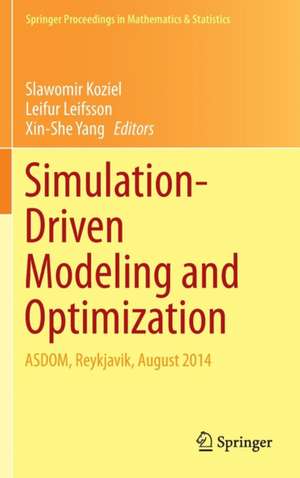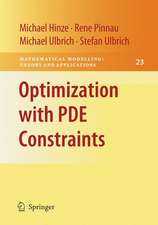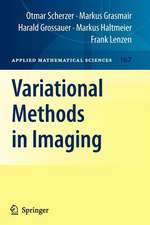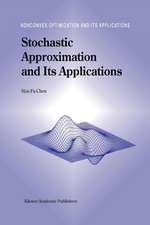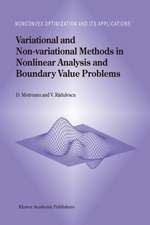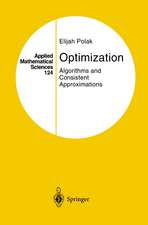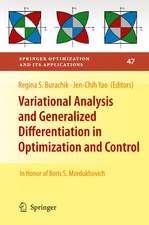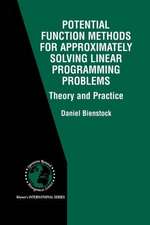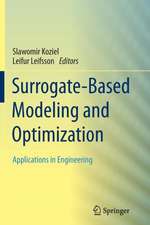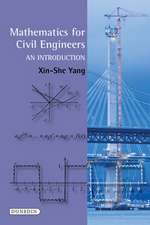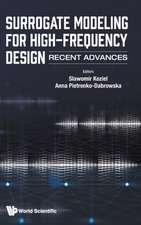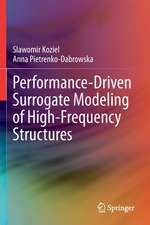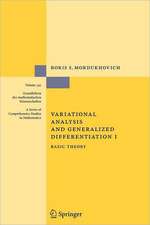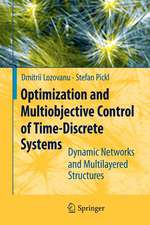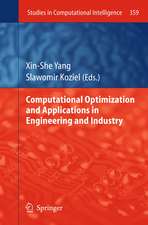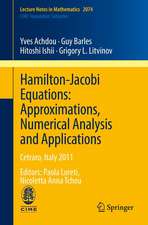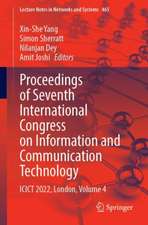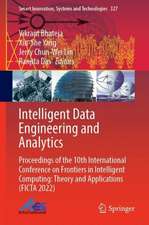Simulation-Driven Modeling and Optimization: ASDOM, Reykjavik, August 2014: Springer Proceedings in Mathematics & Statistics, cartea 153
Editat de Slawomir Koziel, Leifur Leifsson, Xin She Yangen Limba Engleză Hardback – 13 feb 2016
High-fidelity simulation models allow for accurate evaluations of the devices and systems, which is critical in the design process, especially to avoid costly prototyping stages. Despite this and other advantages, the use of simulation tools in the design process is quite challenging due to associated high computational cost. The steady increase of available computational resources does not always translate into the shortening of the design cycle because of the growing demand for higher accuracy and necessity to simulate larger and more complex systems. For this reason, automated simulation-driven design—while highly desirable—is difficult when using conventional numerical optimization routines which normally require a large number of system simulations, each one already expensive.
| Toate formatele și edițiile | Preț | Express |
|---|---|---|
| Paperback (1) | 950.03 lei 6-8 săpt. | |
| Springer International Publishing – 31 mar 2018 | 950.03 lei 6-8 săpt. | |
| Hardback (1) | 956.18 lei 6-8 săpt. | |
| Springer International Publishing – 13 feb 2016 | 956.18 lei 6-8 săpt. |
Din seria Springer Proceedings in Mathematics & Statistics
- 15%
 Preț: 642.03 lei
Preț: 642.03 lei - 15%
 Preț: 646.62 lei
Preț: 646.62 lei - 18%
 Preț: 727.31 lei
Preț: 727.31 lei - 24%
 Preț: 1236.85 lei
Preț: 1236.85 lei - 9%
 Preț: 624.24 lei
Preț: 624.24 lei - 18%
 Preț: 727.97 lei
Preț: 727.97 lei - 18%
 Preț: 1016.01 lei
Preț: 1016.01 lei - 15%
 Preț: 656.43 lei
Preț: 656.43 lei - 18%
 Preț: 947.35 lei
Preț: 947.35 lei - 15%
 Preț: 646.62 lei
Preț: 646.62 lei - 18%
 Preț: 948.92 lei
Preț: 948.92 lei - 18%
 Preț: 1699.47 lei
Preț: 1699.47 lei - 18%
 Preț: 1120.18 lei
Preț: 1120.18 lei - 15%
 Preț: 644.95 lei
Preț: 644.95 lei - 18%
 Preț: 1233.83 lei
Preț: 1233.83 lei - 18%
 Preț: 1120.18 lei
Preț: 1120.18 lei - 18%
 Preț: 1033.37 lei
Preț: 1033.37 lei - 18%
 Preț: 948.92 lei
Preț: 948.92 lei - 18%
 Preț: 896.08 lei
Preț: 896.08 lei - 18%
 Preț: 1115.46 lei
Preț: 1115.46 lei - 18%
 Preț: 952.09 lei
Preț: 952.09 lei - 18%
 Preț: 1230.66 lei
Preț: 1230.66 lei - 15%
 Preț: 647.59 lei
Preț: 647.59 lei - 18%
 Preț: 1124.92 lei
Preț: 1124.92 lei - 20%
 Preț: 1630.95 lei
Preț: 1630.95 lei - 18%
 Preț: 1123.35 lei
Preț: 1123.35 lei - 18%
 Preț: 950.52 lei
Preț: 950.52 lei - 18%
 Preț: 947.35 lei
Preț: 947.35 lei - 18%
 Preț: 1003.70 lei
Preț: 1003.70 lei - 18%
 Preț: 956.81 lei
Preț: 956.81 lei - 18%
 Preț: 889.75 lei
Preț: 889.75 lei - 18%
 Preț: 1000.24 lei
Preț: 1000.24 lei - 18%
 Preț: 1122.56 lei
Preț: 1122.56 lei - 18%
 Preț: 1005.74 lei
Preț: 1005.74 lei - 18%
 Preț: 950.96 lei
Preț: 950.96 lei - 18%
 Preț: 1009.08 lei
Preț: 1009.08 lei - 18%
 Preț: 1008.91 lei
Preț: 1008.91 lei - 18%
 Preț: 947.35 lei
Preț: 947.35 lei - 18%
 Preț: 1113.89 lei
Preț: 1113.89 lei - 18%
 Preț: 1113.71 lei
Preț: 1113.71 lei - 18%
 Preț: 1400.35 lei
Preț: 1400.35 lei - 18%
 Preț: 969.44 lei
Preț: 969.44 lei - 18%
 Preț: 1401.93 lei
Preț: 1401.93 lei - 18%
 Preț: 948.92 lei
Preț: 948.92 lei - 18%
 Preț: 1392.46 lei
Preț: 1392.46 lei - 20%
 Preț: 878.68 lei
Preț: 878.68 lei - 20%
 Preț: 1002.91 lei
Preț: 1002.91 lei - 18%
 Preț: 1120.99 lei
Preț: 1120.99 lei - 18%
 Preț: 942.63 lei
Preț: 942.63 lei
Preț: 956.18 lei
Preț vechi: 1166.08 lei
-18% Nou
Puncte Express: 1434
Preț estimativ în valută:
182.99€ • 198.70$ • 153.71£
182.99€ • 198.70$ • 153.71£
Carte tipărită la comandă
Livrare economică 23 aprilie-07 mai
Preluare comenzi: 021 569.72.76
Specificații
ISBN-13: 9783319275154
ISBN-10: 3319275151
Pagini: 404
Ilustrații: VIII, 404 p. 186 illus., 135 illus. in color.
Dimensiuni: 155 x 235 x 24 mm
Greutate: 0.75 kg
Ediția:1st ed. 2016
Editura: Springer International Publishing
Colecția Springer
Seria Springer Proceedings in Mathematics & Statistics
Locul publicării:Cham, Switzerland
ISBN-10: 3319275151
Pagini: 404
Ilustrații: VIII, 404 p. 186 illus., 135 illus. in color.
Dimensiuni: 155 x 235 x 24 mm
Greutate: 0.75 kg
Ediția:1st ed. 2016
Editura: Springer International Publishing
Colecția Springer
Seria Springer Proceedings in Mathematics & Statistics
Locul publicării:Cham, Switzerland
Public țintă
ResearchCuprins
Numerical Aspects of Model Order Reduction for Gas Transportation Networks (Grundel, S., Hornung, N. & Roggendorf, S.).- Parameter Studies for Energy Networks with Examples from Gas Transport (Clees, T.).- Fast Multi-Objective Aerodynamic Optimization Using Space-Mapping-Corrected Multi-Fidelity Models and Kriging Interpolation (Leifsson, L. et al.).- Assessment of Inverse and Direct Methods for Airfoil and Wing Design (Zhang, M. & Rizzi, A.W.).- Performance Optimization of EBG-Based Common Mode Filters for Signal Integrity Applications (Orlandi, A. et al.).- Unattended Design of Wide-Band Planar Filters using a Two-Step Aggressive Space Mapping (ASM) Optimization Algorithm (Boria, V. et al.).- Two-Stage Gaussian Process Modeling of Microwave Structures for Design Optimization (Jacobs, J.P. & Koziel, S.).- Efficient Reconfigurable Microstrip Patch Antenna Modeling Exploiting Knowledge Based Artificial Neural Networks (Simsek, M. & Aoad, A.).- Expedited Simulation-DrivenMulti-Objective Design Optimization of Quasi-Isotropic Dielectric Resonator Antenna (Bekasiewicz, A. et al.).- Optimal Design of Photonic Crystal Nanostructures (Hassan, A.-K., Rafat, N. & Mohamed, A.S.A.).- Design Optimization of LNAs and Reflectarray Antennas using the Full-Wave Simulation based Artificial Intelligence Models with the Novel Metaheuristic Algorithms (Güneş, F., Demirel, S. & Nesil, S.).- Stochastic Decision-Making in Waste Management Using a Firefly Algorithm-Driven Simulation-Optimization Approach for Generating Alternatives (Yeomans, J.S., Imanirad, R. & Yang, X.-S.).- Linear and Nonlinear System Identification using Evolutionary Optimisation (Worden, K. et al.).- A Surrogate-Model-Assisted Evolutionary Algorithm for Computationally Expensive Design Optimization Problems with Inequality Constraints (Liu, B., Zhang, Q. & Gielen, G.).- Sobol Indices for Dimension Adaptivity in Sparse Grids (Dwight, R.P., Desmedt, S.G.L., & Omrani, P.S.).
Textul de pe ultima copertă
This edited volume is devoted to the now-ubiquitous use of computational models across most disciplines of engineering and science, led by a trio of world-renowned researchers in the field. Focused on recent advances of modeling and optimization techniques aimed at handling computationally-expensive engineering problems involving simulation models, this book will be an invaluable resource for specialists (engineers, researchers, graduate students) working in areas as diverse as electrical engineering, mechanical and structural engineering, civil engineering, industrial engineering, hydrodynamics, aerospace engineering, microwave and antenna engineering, ocean science and climate modeling, and the automotive industry, where design processes are heavily based on CPU-heavy computer simulations. Various techniques, such as knowledge-based optimization, adjoint sensitivity techniques, and fast replacement models (to name just a few) are explored in-depth alongwith an array of the latest techniques to optimize the efficiency of the simulation-driven design process.
High-fidelity simulation models allow for accurate evaluations of the devices and systems, which is critical in the design process, especially to avoid costly prototyping stages. Despite this and other advantages, the use of simulation tools in the design process is quite challenging due to associated high computational cost. The steady increase of available computational resources does not always translate into the shortening of the design cycle because of the growing demand for higher accuracy and necessity to simulate larger and more complex systems. For this reason, automated simulation-driven design—while highly desirable—is difficult when using conventional numerical optimization routines which normally require a large number of system simulations, each one already expensive.
High-fidelity simulation models allow for accurate evaluations of the devices and systems, which is critical in the design process, especially to avoid costly prototyping stages. Despite this and other advantages, the use of simulation tools in the design process is quite challenging due to associated high computational cost. The steady increase of available computational resources does not always translate into the shortening of the design cycle because of the growing demand for higher accuracy and necessity to simulate larger and more complex systems. For this reason, automated simulation-driven design—while highly desirable—is difficult when using conventional numerical optimization routines which normally require a large number of system simulations, each one already expensive.
Caracteristici
Presents strategies for enhancing automated simulation-driven modeling design practices Highlights invaluable techniques for areas such as engineering, hydrodynamics, ocean science and climate modeling, where design processes are rooted in CPU-heavy computer simulations Accessible with only a working knowledge of calculus and numerical modeling and optimization
